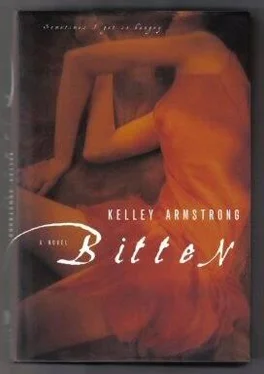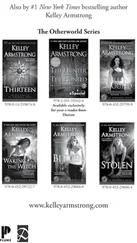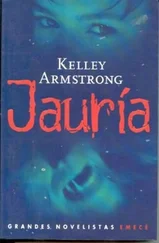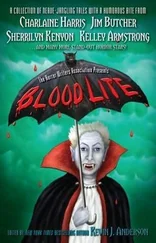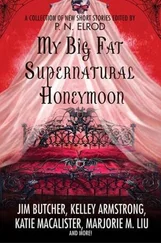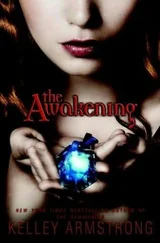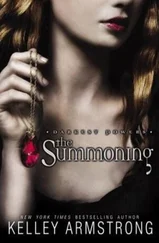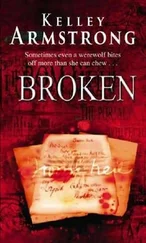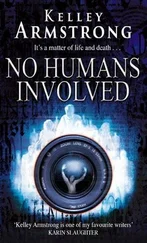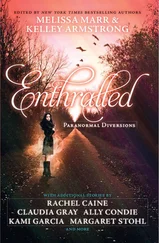When Philip came back, I was hovering over the phone, glaring down at it as if I could mentally force Jeremy to pick up.
"Still no answer?" Philip said.
I shook my head. He studied my face more closely than I liked. As I turned away, he crossed the room and put his hand on my shoulder.
"You're worried."
"Not really. I just-"
"It's okay, hon. If it were my family, I'd be worried. Maybe you should go there. See what's wrong. It sounded urgent."
I pulled away. "No, that's ridiculous. I'll keep calling-"
"It's family, hon," he said, as if that answered any argument I could come up with. For him, it did. That was one thing I couldn't argue with. When Philip and I first became serious, the lease on his apartment came up and he'd made it clear he wanted to move in with me, but I'd resisted. Then he'd taken me to his family reunion. I'd met his mother and his father and his sister and seen how he interacted with them, how integral they were to his life. The next day I'd told him not to extend his lease.
Now Philip expected me to go to the aid of someone he thought was my family. If I refused, would he think I wasn't the kind of person he wanted? I wouldn't take that chance. I promised to keep trying. I promised if I didn't get hold of Jeremy by noon, I'd fly to New York State to see what was wrong.
Each time I called over the next few hours, I prayed for an answer. The only reply I got was the click of the answering machine.
Philip drove me to the airport after lunch.
The plane landed at Syracuse-Hancock at seven p.m. I tried Jeremy's number, but only got the answering machine. Again. By now I was more annoyed than worried. As the distance between us lessened, my memory improved and I remembered what it was like to live at Stonehaven, Jeremy's country estate. In particular, I recalled the resident phone-answering habits, or lack thereof. Two people lived at Stonehaven, Jeremy and his foster-son-turned-bodyguard, Clayton. There were two phones in the five-bedroom house. The one in Clay's room was connected to the answering machine, but the phone itself had lost the ability to ring four years ago, when Clay whipped it across the room after it dared disturb his sleep two nights in a row. There was also a phone in the study, but if Clay needed to use the line for his laptop, he often neglected to plug the phone back in, sometimes for days. Even if, by chance, there was an operating telephone in the house, both men had been known to sit five feet away and not bother picking it up. And Philip thought my phone habits were bad.
The more I thought about it, the more I fumed. The more I fumed, the more determined I was not to leave the airport until someone answered the damned phone. If they summoned me, they should pick me up. At least, this was my excuse. The truth was that I was loath to leave the bustle of the airport. Yes, that sounds crazy. Most people judge the success of a plane flight by how little time they have to spend in the airport. Normally, I would have felt the same way, but as I sat there, taking in the sights and smells of the nearly empty terminal, I reveled in the humanness of it. Here in the airport I was an anonymous face in a sea of equally anonymous faces. There was comfort in that, the feeling of being part of something larger, but not at the center of it. Things would change the minute I walked out of here and into Stonehaven.
Two hours later, I decided I couldn't put it off any longer. I made my last call to Stonehaven and left a message. Two words. "I'm coming." It would do.
Getting to Stonehaven wasn't easy. It was in remote upstate New York near a small town called Bear Valley. As my cab pulled away from the airport, it was already night. Syracuse glowed somewhere to the south, but the cab turned north once it reached highway 81. The lights of North Syracuse appeared to my left, faded fast, then vanished into the night. A dozen miles later the driver turned off the highway and the darkness was complete. In the quiet of the country night, I relaxed. Werewolves weren't meant for urban life. There was no place to run, and the sheer crush of people often provided more temptation than anonymity. Sometimes I think I chose to live in downtown Toronto simply because it was against my nature, one more instinct for me to defeat.
As I looked out the window, I ticked off the time with the landmarks. With each passing mark, my stomach danced faster. Trepidation, I told myself. Not anticipation. Even if I'd spent the better part of ten years at Stonehaven, I didn't consider it my home. The concept of home was difficult for me, an ethereal construct emerging from dreams and stories rather than actual experience. Of course, I did have a home once, a good home and a good family, but it didn't last long enough to leave more than the most fleeting impression.
My parents died when I was five. We'd been coming home from the fair, taking a back road because my mother wanted to show me a miniature pony foal she'd seen at a farm along there. I could hear my father laughing, asking my mother how she expected me to see anything in a field at midnight. I remember him turning to look over the seat, grinning at me while he teased my mother beside me. I don't remember what happened next, no squealing tires, no screams, no careering out of control. Just blackness.
I don't know how I got on the side of the road. I'd been seat belted in, but must have crawled out after the accident. All I remember is sitting in the gravel beside my father's bloodied body, shaking him, talking to him, pleading with him to answer and not understanding why he didn't, knowing only that my father always answered, never ignored me, but all he did now was stare at me, eyes wide and unblinking. I remember hearing myself start to whimper, a five-year-old, crouched by the side of the road, staring into my father's eyes, whimpering because it was so dark and there was no one coming to help, whimpering because my mother was back in the crushed car, not moving, and my father was lying here in the dirt, not answering me, not holding me, not comforting me, not helping my mother get out of the car, and there was blood, so much blood, and broken glass everywhere, and it was so dark and so cold and no one was coming to help.
If I had any extended family, I never heard of them. After my parents died, the only person who tried to claim me was my mother's best friend and she was refused on the grounds that she was unmarried. However, I only spent a couple of weeks in the children's home before I was snatched up by the first couple who saw me. I can still see them, kneeling before me, oooing and ahhhing about what a beautiful child I was. So tiny, so perfect with my white-blond hair and my blue eyes. A porcelain doll, they called me. They took their doll home and started their perfect life. But it didn't work out quite that way. Their precious doll sat in a chair all day and never opened her mouth, then at night-every night-she screamed until dawn. After three weeks they returned me. So I went from one foster family to the next, always taken by the ones utterly charmed by my face and utterly incapable of handling my scarred psyche.
As I grew into adolescence, the couples who picked me from the home changed. It was no longer the wife who chose me but the husband, picking up on my childish beauty and my fear. I became the favored choice of male predators who were looking for a very special kind of child. Ironically, it was through these monsters that I first found my strength. As I grew older, I began to see them for what they were, not all-powerful bogeymen who slipped into my room at night, but weak creatures terrified of rejection and exposure. With that realization, the fear slipped away. They could touch me, but they couldn't touch me, not the me who lay beyond my body. As the fear subsided, so did the rage. I despised them and their equally weak, blind wives, but they weren't worthy of my anger. I wouldn't let myself be angry at them, wouldn't let myself waste time and effort better spent elsewhere. If I wanted to escape this life, I had to do it myself. That didn't mean running away. It meant staying and surviving. It meant studying hard and making the honors list even if I rarely went a full year without switching schools. Succeeding at school would mean acceptance into university, which would mean a degree, which would mean a career, which would mean the kind of life my social workers and foster families assumed was beyond me. At the same time, I discovered another source of power-the strength of my own body. I grew tall and rangy. A teacher signed me up for track-and-field, hoping it would help me get close to other children. Instead I learned to run, discovering the absolute bliss, the unparalleled pleasure of the physical, feeling my strength and my speed for the first time. By the time I was midway through high school I was lifting weights and working out daily. My foster father wasn't touching me by then. I wasn't anyone's idea of a victim by then.
Читать дальше
